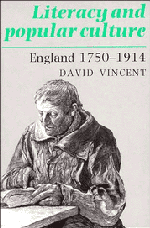Summary
From the beginning, the rates of literacy derived from the marriage registers were seen as an index of the progress of the nation's schools. In his second annual report the Registrar General explained why he had decided to extend the analysis of births, deaths and marriages to include some of the ancillary information collected at the weddings: ‘I have found’, he wrote, ‘the Registers of Marriages calculated to throw much light upon the state of education with respect to writing, among the adult population of England and Wales.’ On the face of it, the tables which appeared in the subsequent reports bore witness to a striking achievement. Whereas the New Poor Law did little more than keep pauperism in check, and the public health legislation was for decades ineffective, the field of elementary education could be regarded as an outstanding example of successful co-operation between private philanthropy and public intervention. We now know that during the eighty years between Hardwick's Marriage Act and the beginning of state involvement in education, make illiteracy had been almost stable at 40 per cent and female illiteracy had fallen only ten points from an initial level of over 60 per cent. During the succeeding eighty years, as public expenditure on education rose from £50,000 to £19.5 million, the level of illiteracy fell with gathering momentum.
- Type
- Chapter
- Information
- Literacy and Popular CultureEngland 1750–1914, pp. 53 - 94Publisher: Cambridge University PressPrint publication year: 1989



